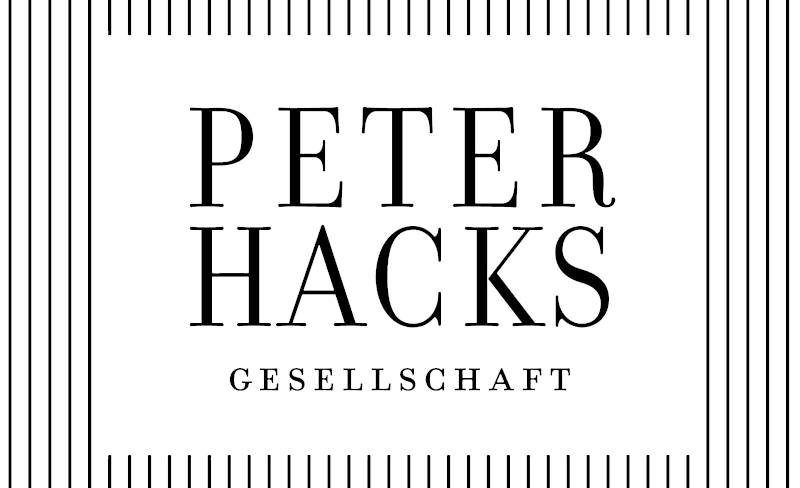
Dr. Jana Ondráková vom Institut für deutsche Sprache und Literatur der Universität Hradec Králové und Prof. Dr. Jiří Munzar, Professor für die Geschichte der deutschen Literatur der Masaryk-Univerisität, haben jüngst eine Studie unter dem Titel Peter Hacks im Kontext des modernen deutschen Dramas und sein Stück „Ein Gespräch im Hause Stein über den abwesenden Herrn von Goethe“ ("Peter Hacks v kontextu moderního německého dramatu a jeho hra "rozhovor v domě Steinových o nepřítomném panu Goethovi") vorgelegt, die sie sich mit der Rolle von Peter Hacks in der modernen deutschen Dramenliteratur, der Entstehung des Dramas "Gespräch im Hause Stein" und der Wirkung von Peter Hacks' Werk in der tschechischen Volksrepublik auseinandersetzt.
Die Autorin und der Verlag Nakladatelství Gaudeamus waren so freundlich uns ein englisches Resümee der Studie zu zusenden, die wir Ihnen nicht vorenthalten wollen.
Ondráková, Jana / Munzar, Jiří: Peter Hacks v kontextu moderního německého dramatu a jeho hra "rozhovor v domě Steinových o nepřítomném panu Goethovi“, 2016.
Resümee:
This monograph makes readers familiar with the personality of one of the most important German-writing playwrights of the second half of the 20th century, Peter Hacks, and his works. Especially his monodrama “A Discussion in the Stein Home about the Absent Mr. Goethe” is presented in a detailed way. The publication is addressed to Germanists, persons interested in the history of theatre, experts in and lovers of theatre and to the general public. It can help them to reveal more general relationships existing in the arts and culture in the countries of the socialist block in the seventies of the 20th century. The authors try to convey a kind of insight into the literally process in the German-speaking environment of that time; the creation and stage realization of drama works which have addressed Czech audience are mainly focused.
The first chapter presents the developmental context of the modern German drama and theatre, which are (differently form the German fiction and German novel) relatively little-known to Czech readers.
The second chapter is devoted to Hacks' works in the context of the after-war German drama, and Hacks' approach to some tendencies and authors of that time period. The German dramatic creation after the World War II quite often tended to bring back and re-create old topics. There are more causes of this phenomenon existing in the modern German drama – for example ideological disputes and frequent efforts to come up with a new view of reality, history and numerous historical personalities.
Writers and literary critics have frequently asked whether the works created in the past are still topical for present readers. Are the works by older generations and their topics still able to address present readers? Or do contemporary people have their own conflicts which have appeared in the new social system and which now wait for being literally processed? Is it necessary to accept or to refuse the literary heritage? If the answer is to accept, which literary movements are ideologically the closest to the present ideals? Writers' opinions vary – some authors were interested in romanticism, others were interested in classicism or antiquity. These authors wanted to re-discover the contents of the works for contemporary people and to make arts and life more closely connected. An important role in these efforts was played by the theatre. Numerous playwrights started to use the world´s literature's topics, and they presented them from their contemporary point of view in connection with the issues of the then existing socialist reality. New adaptations of classical works were popular mainly in the literature of the former German Democratic Republic. The role of the literary heritage and Hacks' opinions on this issue are presented in the third chapter.
The fourth chapter analyses Hacks' drama about Goethe, which was put on stage in March 1976 in the State Theatre in Dresden, from various angles. The story takes place in October 1786 after Goethe unexpectedly and without any trace disappeared while finishing his stay in Karlsbad. The play analyses in a psychoanalytical way the characteristic features of the main female character, Mrs. von Stein, and of Goethe himself. Charlotte's features are revealed to the audience directly during her monologue; Goethe's characteristic features are, however, only vicariously presented.
The fifth chapter thoroughly presents historical and cultural sources used by the author of the monodrama. We can do nothing else than admire the way in which Hacks managed to include such numerous factual items of information in a play written on such a small number of pages. His monodrama is literally stuffed with historical facts, although Hacks did not intend (as he himself said) to create a biographical work.
The final chapter briefly presents ways in which Hacks' works were accepted in Germany and in our country. Peter Hacks is a controversial personality, and even after his death in 2003 literary critics and experts do not stop discussing the issue of his works' contribution for the German and World's literature.
The appendixes to the publication present vintage photographs and extracts of the monodrama.
Desweiteren findet sich auf der Internetseite der Mährischen Bibliothek (Moravská Zemská Knihovna) eine genauere Titelangabe, sowie ein Inhaltsverzeichnis auf tschechisch. Link
Wir möchten uns vielmals bei den Autoren und Michaela Loukotová (Nakladatelství Gaudeamus) bedanken.



